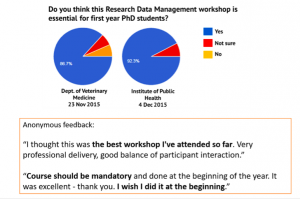Today is the deadline for those universities in receipt of an RCUK grant to submit their reports on the spend. We have just submitted the Cambridge University 2015-2016 report to the RCUK and have also made it available as a dataset in our repository.
Compliance
Cambridge had an estimated overall compliance rate of 76% with 46% of all RCUK funded papers available through the gold route and 30% of all RCUK funded papers available through the green route.
The RCUK Open Access Policy indicates that at the end of the fifth transition year of the policy (March 2018) they expect 75% of Open Access papers from the research they fund will be delivered through immediate, unrestricted, on‐line access with maximum opportunities for re‐use (‘gold’). Because Cambridge takes the position that if there is a green option that is compliant we do not pay for gold, our gold compliance number is below this, although our overall compliance level is higher, at 76%.
Compliance caveats
The total number of publications arising from research council funding was estimated by searching Web of Science for papers published by the University of Cambridge in 2015, and then filtered by funding acknowledgements made to the research councils. The number of papers (articles, reviews and proceedings papers) returned in 2015 was 2080. This is almost certainly an underestimate of the total number of publications produced by the University of Cambridge with research council funding. The analysis was performed on 15/09/2016.
Expenditure
The APC spend we have reported is only counting papers submitted to the University of Cambridge Open Access Team between 1 August 2015 and 31 July 2016. The ‘OA grant spent’ numbers provided are the actual spend out of the finance system. The delay between submission of an article, the commitment of the funds and the subsequent publication and payment of the invoice means that we have paid for invoices during the reporting period that were submitted outside the reporting period. This meant reconciliation of the amounts was impossible. This funding discrepancy was given in ‘Non-staff costs’, and represents unallocated APC payments not described in the report (i.e. they were received before or after the reporting period but incurred on the current 2015-16 OA grant).
The breakdown of costs indicates we have spent 4.6% of the year’s allocation on staff costs and 5.1% on systems support. We noted in the report that the staff time paid for out of this allocation also supports the processing of Wellcome Trust APCs for which no support is provided by Wellcome Trust.
Headline numbers
- In total Cambridge spent £1,288,090 of RCUK funds on APCs
- 1786 articles identified as being RCUK funded were submitted to the Open Access Service, of which 890 required payment for RCUK*
- 785 articles have been invoiced and paid
- The average article cost was ~£2008
Caveats
The average article cost can be established by adding the RCUK fund expenditure to the COAF fund expenditure on co-funded articles (£288,162.28) which gives a complete expenditure for these 785 articles of £1,576,252.42. The actual average cost is £2007.96.
* The Open Access Service also received many COAF only funded and unfunded papers during this period. The number of articles paid for does not include those made gold OA due to the Springer Compact as this would throw out the average APC value.
Observations
In our report on expenditure for 2014 the average article APC was £1891. This means there has been a 6% increase in Cambridge University’s average spend on an APC since then. It should be noted that of the journals for which we most frequently process APCs, Nature Communication is the second most popular. This journal has an APC of £3,780 including VAT.
Datasets on Cambridge APC spend 2009-2016
Cambridge released the information about its 2014 APC spend for RCUK and COAF in March last year and intended to do a similar report for the spend in 2015, however a recent FOI request has prompted us to simply upload all of our data on APC spend into our repository for complete transparency. The list of datasets now available is below.
4. Report presented to Jisc for article processing charges managed by the University of Cambridge, 2014
Note: In October 2014 we started using a new system for recording submissions. This has allowed us to obtain more detailed information and allow multiple users to interact with the system. Until December 2015 our financial information was recorded in the spreadsheet below. There is overlap between reports 5. and 6. for the period 24 October and 31 December 2015. As of January 2016, all data is being collected in the one place.
Note: In 2013 the Open Access Service began and took responsibility for the new RCUK fund, and was transferred responsibility for the new Charities Open Access Fund (COAF). At this time the team were recording when an article was fully Wellcome Trust funded, even though the Wellcome Trust funding is a component of COAF.
Note: Management of the funds to support open access publishing has changed over the past seven years. Before the RCUK open access policy came into force in 2013, the Wellcome Trust funds were managed by the School of Biological Sciences.
Published 14 September 2016
Written by Dr Danny Kingsley & Dr Arthur Smith


